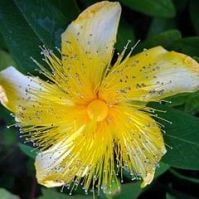Latin name: Hypericum perforatum
Common names: Goatweed, Tipton’s weed, Chase-devil
 This herb is known for many names, but most commonly it is called “goatweed” and “tipton’s weed.” The name St John’s wort was derived from John the Baptist because this herb blooms at the time of St. John the Baptist’s feast day which is the 24th of June.
This herb is known for many names, but most commonly it is called “goatweed” and “tipton’s weed.” The name St John’s wort was derived from John the Baptist because this herb blooms at the time of St. John the Baptist’s feast day which is the 24th of June.
This herb is described in having yellow flowers and looks very bright and cheerful when in bloom. This herb dates back for its medicinal purposes first recorded in ancient Greece. It was used for many centuries to help treat mental disorders and nerve pain.
St. John’s wort consists of astringent and cooling properties that is used to calm a person’s nerves, lessen inflammation and promote wound healing.

What it is used for:
- For centuries, St. John’s wort was used to treat disorders in the head and helps in nerve pain
- Said to contain sedative components to treat anxiety and sleep disorders
- Used as an ointment for insect bites, wounds and burns
- Said to be helpful in treating emotional disorders, mild to moderate depression, insomnia and nerve tension
- Bedwetting for children
- Could treat menstrual problems and PMS (premenstrual syndrome)
- Used to ward off intestinal worms
- Known to be effective in soothing and cleaning burns, sores, bruises, sprains and cramps
- Beneficial in hemorrhoids
How it is used:
St. John’s wort can come in teas, capsules, tablets, liquid extracts and topical preparations. The flowering tops of this herb is the part of the plant that is used to derive the many forms that it comes in.
Side effects and cautions:
- Could increase sensitivity to the sunlight
- Other side effects may include: dry mouth, anxiety, dizziness, gastrointestinal uneasiness, headache, fatigue or sexual dysfunction
- This herb can cause interaction with certain medications (antidepressants, seizure controlling drugs, anticoagulants, oral contraceptives, digoxin and other medications used for the HIV infection. Consultation with your healthcare professional should be done before taking this herb
- St. John’s wort has not been proven to treat depression. If depression is not correctly diagnosed and not properly treated, symptoms may worsen
